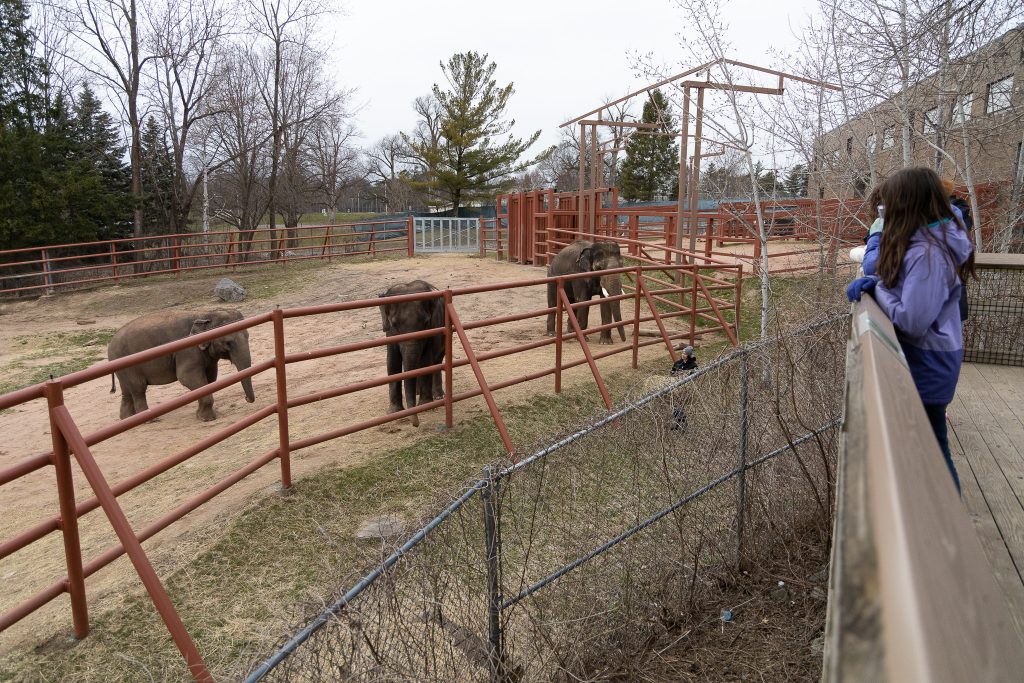
Experts: Governments break law Hiding Behind NonProfits
The Onondaga County Zoo’s naming contest for baby elephants sheds light on a scheme governments use to avoid public scrutiny.

onprofits serve many functions in New York, from building affordable housing to putting food on people’s tables.
They also, it turns out, can be a good place for governments to hide money and skirt freedom of information laws. That seems to be the case, at least, when it comes to the Rosamond Gifford Zoo, an entity of the Onondaga County Parks Department, and its relationship with the nonprofit Friends of the Rosamond Gifford Zoo.
The Zoo held a contest late last year to name its rare twin baby elephants. The vote was open to the public, but the results were never announced. The winning names: Yaad and Tukada. Yaad means “memory” in Indian. Tukada, also Indian, means “chip.”
The announcement comes just over a month after Micron Technologies, a microchip manufacturer, announced it will build a memory chip factory in Central New York expected to employ thousands of people. The names were announced by April Arnzen, the senior vice president of Micron Technology, at the zoo in December.
Social media erupted with conspiracies, with posters skeptical that the public just happened to choose names that honor the area’s new 800-pound gorilla.
Users like Par Avion took to Twitter to question the outcome: “Well that was a convenient result,” Avion tweeted, while @mmmmcaveat15 added “your organization should be ashamed for selling out to Micron.”
We posted in a Facebook group looking for Central New Yorkers who were frustrated with the vote results.
“I don’t know which outcome would be more lame; that we may have actually picked those names, or the zoo stuffed the ballot box,” James Fedkiw commented on the post in the group Syracuse NY Area Community Events.
So we set out to discover the truth: What names did the public vote for? The Zoo is a public entity, so surely that’s information obtainable through the state’s Freedom of Information Law. But the county first claimed the zoo wasn’t subject to open-records laws.
“The Friends of the Rosamond Gifford Zoo (“Friends”), the organization which operated and managed the naming contest, is a nonprofit, non-governmental agency constituted under Section 501c-3 of the Federal Tax Code, and as such is not subject to FOIL,” FOIL Officer Benjamin Vaus said. “The Friends maintain their own records and do not maintain records for the County.”
But the zoo is a public entity, officially part of the Park’s Department, with 41 county employees and a budget of more than $5.7 million, according to Onondaga County’s 2023 budget. Surely, then, the county must have some records pertaining to the zoo, the vote and Micron.
“Parks Department records were searched and no responsive records located,” Vaus wrote in denying our appeal.
Experts say the county may be violating the law, that other governments are doing the same thing, and that stronger laws may be needed to deal with the problem.

“In the case at the county, it appears that they’re just violating the law entirely by denying your request,” said Rachael Fauss, senior policy advisor at Reinvent Albany. “There’s no reason that you shouldn’t be able to get records related to how the zoo and this friends group are interacting. Absolutely not, that is information that is the public’s because we pay for it.”
Kristin O’Neill (no relation), the assistant director of the state Committee on Open Government, agrees.
“The zoo is clearly owned and operated by the County (specifically operated by the County Parks Department),” she said. “Any records maintained by the County Parks Department or maintained for the County by the Friends of the Park organization would be subject to the Law. … Even if the records are maintained by the not-for-profit, it is likely they are maintained for the county and would still be subject to FOIL.”
So we filed a second FOIL request on Feb. 28 with a broader scope, this time requesting any records that describe the county’s Department of Parks & Recreations records’ management systems, any county documents from 2022 that reference the Friends of the Zoo, and documentation on how our first FOIL request was processed.
On March 1, the county sent a reply that it had received the request and would notify us of “the availability of such records within 60 business days. New York state law requires governments to provide access to requested records or to deny them in writing within 20 business days. As of May 3, we have not received any records or a denial.
We reached out to the Friends of the Zoo, but they declined to comment, as did the county law department.
Justin Sayles, executive communications director for Onondaga County, defends the county. He said the Friends of the Zoo, not the county, conducted the naming contest. He brushed off the concerns of the FOIL experts and reiterated the law department’s FOIL denial letter, saying the county is not responsible for records maintained by the friends. “The county is not hiding behind anything,” Sayles said.
The problem, experts say, extends beyond Onondaga County.
“It’s absolutely common,” Fauss said, especially in New York City, where they help officials avoid campaign finance laws.
“The Police Benevolent Association raises a ton of money on behalf of the police department,” she said of the NYPD. “There is a mayor’s fund for New York City that can raise money on behalf of the government and fund pilot programs or particular things within New York City. I imagine these … exist in different ways all over the state. … It’s a way of circumventing campaign finance law”
To solve this problem Fauss recommends changing the law.
“The real remedy is just making our state’s freedom of information laws — which applies to governments throughout the state, local governments and bodies like this — stronger,” she said.
This isn’t an easy solution when the government makes laws for itself.

“It’s a heavy lifting to improve these laws,” Fauss said. “The governor has to sign them and the governor controls agencies that are subject to FOIL requests. So, you know, the incentives aren’t baked in for elected leaders to want to improve.”
Fauss suspects a related issue led to the denial of our FOIL request.
“There’s likely one person who handles the FOIL requests and it’s just much easier for them to just deny everything rather than to try to fulfill these requests,” she said. ”There’s a real big resource problem for governments being able to respond to the public.”
Catherine Herrold, a professor of Public Administration and International Affairs Department at Syracuse University, says half-baked engagement efforts like the zoo’s elephant naming vote can help fuel distrust in government.
“We see declining levels of trust,” she said. “We see declining levels of engagement because there’s a feeling that our public officials don’t want to hear from us or that when they do hear from us, our voices aren’t really taken into strong consideration when decisions are made.”
